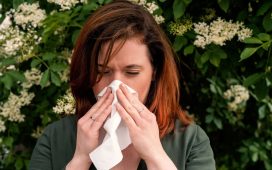Seven million people die each year from illnesses attributable to air pollution, yet it has never had global recognition in the same way as Aids, tuberculosis and malaria, and now there are growing calls from the health sector for that to change.
Relative to other health issues that have access to billion-dollar global funds, air pollution has a far greater health impact, said Christa Hasenkopf, the director of clean air programmes at the Energy Policy Institute at the University of Chicago (Epic).
Pollution contributes to millions of deaths every year from conditions such as heart disease, chronic obstructive pulmonary disease, cancer or pneumonia. That exceeds the 630,000 who died of Aids in 2022, the 608,000 malaria deaths in the same year and even the 1 million who die annually as a result of diarrhoea.
Quick Guide
A common condition
Show
The human toll of non-communicable diseases (NCDs) is huge and rising. These illnesses end the lives of approximately 41 million of the 56 million people who die every year – and three quarters of them are in the developing world.
NCDs are simply that; unlike, say, a virus, you can’t catch them. Instead, they are caused by a combination of genetic, physiological, environmental and behavioural factors. The main types are cancers, chronic respiratory illnesses, diabetes and cardiovascular disease – heart attacks and stroke. Approximately 80% are preventable, and all are on the rise, spreading inexorably around the world as ageing populations and lifestyles pushed by economic growth and urbanisation make being unhealthy a global phenomenon.
NCDs, once seen as illnesses of the wealthy, now have a grip on the poor. Disease, disability and death are perfectly designed to create and widen inequality – and being poor makes it less likely you will be diagnosed accurately or treated.
Investment in tackling these common and chronic conditions that kill 71% of us is incredibly low, while the cost to families, economies and communities is staggeringly high.
In low-income countries NCDs – typically slow and debilitating illnesses – are seeing a fraction of the money needed being invested or donated. Attention remains focused on the threats from communicable diseases, yet cancer death rates have long sped past the death toll from malaria, TB and HIV/Aids combined.
‘A common condition’ is a Guardian series reporting on NCDs in the developing world: their prevalence, the solutions, the causes and consequences, telling the stories of people living with these illnesses.
Tracy McVeigh, editor
Sunil Dahiya, a south Asia analyst at the Centre for Research on Energy and Clean Air, said: “It’s a slow poison; you slowly move towards death and, because of the slow nature of this pandemic, we globally have not been able to respond to it the way we should.”
Less than 1% of international development finance and philanthropic funding goes towards air pollution, according to the Clean Air Fund. Chad, Iraq and Pakistan are the top three most-polluted countries.
“Nobody is saying stop funding work on malaria and tuberculosis and fund work on air pollution instead, but what we are saying is that if you address air pollution, you’re going to reduce multiple non-communicable diseases (NCDs),” said Sean Maguire, the director of strategic partnerships at the fund.
Like similar mechanisms, a global fund for air pollution could operate on a replenishment basis, suggested Hasenkopf, financed by governments and donors.
The focus, said Diane Archer, asenior research fellow at the Stockholm Environment Institute, should be on reducing air pollutants in lower and middle-income countries and improving response to NCD symptoms.
The Democratic Republic of the Congo, for example, sees life expectancy reduced by an estimated three years as a result of poor quality air. Paulson Kasereka Isevulambire, of the African Research Centre on Air Quality and Climate, who is researching the link between NCDs and pollution in DRC, said greater recognition of the issue was needed.
“Like the approach which has been applied for Aids, malaria and TB – and has been successful – that can also be the case for a global fund for air pollution,” he said.
Not everyone is in favour. Peter Baker, the deputy director of the global health policy programme at the Center for Global Development, a nonprofit thinktank in the US, said so many emerging global funds make it “administratively hard” for governments.
He suggested the issue cuts across transport, energy and infrastructure. With other disease areas, it can be a case of providing medication or bednets, but with air pollution and NCDs, the solution lies in changes “that it would be hard for a single global fund to manage”, he said.
Epic plans to launch a fund later this year to focus on data gaps. According to OpenAQ, just 38% of countries share real-time air quality data, so policymakers don’t have the evidence they need. Raising an annual $4m-$8m (£3.2m-£6.3m) from donors would make “a huge dent” in changing that, Hasenkopf said, adding that open data allows better-informed interventions.
“This silent killer is there and the community is unaware of what is happening, including all the health effects it is causing, but also decision-makers don’t have evidence-based data and information for them to take action,” Isevulambire said.
Liz Arnanz, a policy manager at the NCD Alliance, said: “Current climate financing targets are still falling short and NCDs are chronically underfunded, so greater investment coherence is needed to ensure both agendas are driven forward.”











